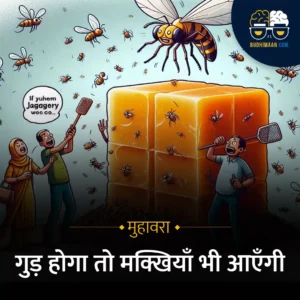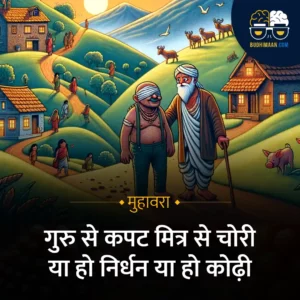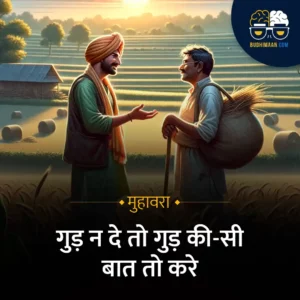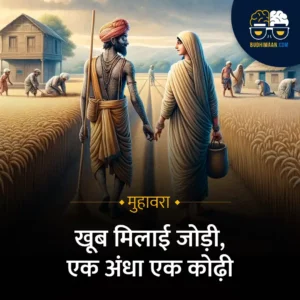अर्थ: “का वर्षा जब कृषि सुखानी” यह मुहावरा तब प्रयुक्त होता है, जब किसी बात की महत्वपूर्णता का समय निकल चुका हो और अब वह बात अधिक महत्वपूर्ण नहीं रही हो।
प्रयोग: जब कोई चीज या सहायता जरूरत से ज्यादा देर बाद आती है और अब वह चीज या सहायता किसी काम की नहीं रहती, तो इस मुहावरे का प्रयोग किया जाता है।
उदाहरण:
-> अनन्य को परीक्षा में पास होने के लिए गाइड चाहिए थी। लेकिन जब उसके मित्र ने उसे गाइड दी, तब परीक्षा समाप्त हो चुकी थी। अनन्य ने कहा, “अब इस गाइड का क्या काम, यह तो ‘का वर्षा जब कृषि सुखानी’ हो गया।”
विशेष टिप्पणी: जैसे कि अगर खेती को पानी की जरूरत होती है, और वर्षा उस समय नहीं होती जब खेत को पानी की जरूरत होती है, और जब खेत सुख चुका होता है तब वर्षा होती है, तो वह वर्षा किसी काम की नहीं रहती। इसी तरह से, कई बार हमें किसी चीज की जरूरत होती है, लेकिन जब वह चीज हमें मिलती है, तो वह चीज हमारे लिए महत्वपूर्ण नहीं रहती।
निष्कर्ष: “का वर्षा जब कृषि सुखानी” मुहावरे से हमें यह सिखने को मिलता है कि समय पर सहायता और संसाधन महत्वपूर्ण होते हैं। देर से आने वाली सहायता अधिकांश समय में असरकारक होती है।
अधिक जानकारी और मुहावरों के बारे में जानने के लिए Budhimaan.com पर बने रहें।

का वर्षा जब कृषि सुखानी मुहावरा पर कहानी:
प्रेमचंद्र एक छोटे गाँव में रहता था। वह अपने खेत में काम करने वाला एक मेहनती किसान था। लेकिन वह हमेशा अपने खेतों को पानी देने में देरी कर देता था। वह सोचता था कि जब भी उसे समय मिलेगा, वह अपने खेतों को पानी देगा।
गाँव में बड़ी तेज धूप और गरमी हुई और ज्यादातर खेत सूख गए। प्रेमचंद्र ने सोचा कि उसे अब अपने खेतों को पानी देना चाहिए। लेकिन जब वह खेतों में पानी डालने गया, तो ज्यादातर फसलें पहले ही सूख चुकी थीं।
वही समय था जब गाँव में अचानक बारिश शुरू हुई। प्रेमचंद्र का मन भारी हो गया। अब वह समझ गया कि ‘का वर्षा जब कृषि सुखानी’ का क्या मतलब होता है। बारिश उस समय हुई जब फसलें पहले ही सूख चुकी थीं। उसकी मेहनत और समय की अहमियत को वह अब समझ गया था।
वही शाम, वह अपने पड़ोसी सुधीर से मिला, जिसने समय पर अपने खेतों को पानी दिया था। सुधीर की फसलें हरे-भरे और स्वस्थ थीं। प्रेमचंद्र ने सुधीर से कहा, “मैं ने समझ लिया है कि समय का सही प्रयोग कितना महत्वपूर्ण है।”
इस कहानी से हमें यह सिखने को मिलता है कि हमें चाहिए कि हम समय का सही प्रयोग करें और देरी ना करें, क्योंकि कभी-कभी देरी करने पर सहायता और संसाधन असरकारक हो जाते हैं।
शायरी:
समय की धारा में बहते चले गए,
जब बारिश हुई, खेत सूखे रह गए।
जीवन में जो मौका हाथ से जाए,
वो फिर लौटकर कभी न आए।
देखो ज़िंदगी की इस राह में,
कितने ख्वाब, अधूरे सा रह गए।
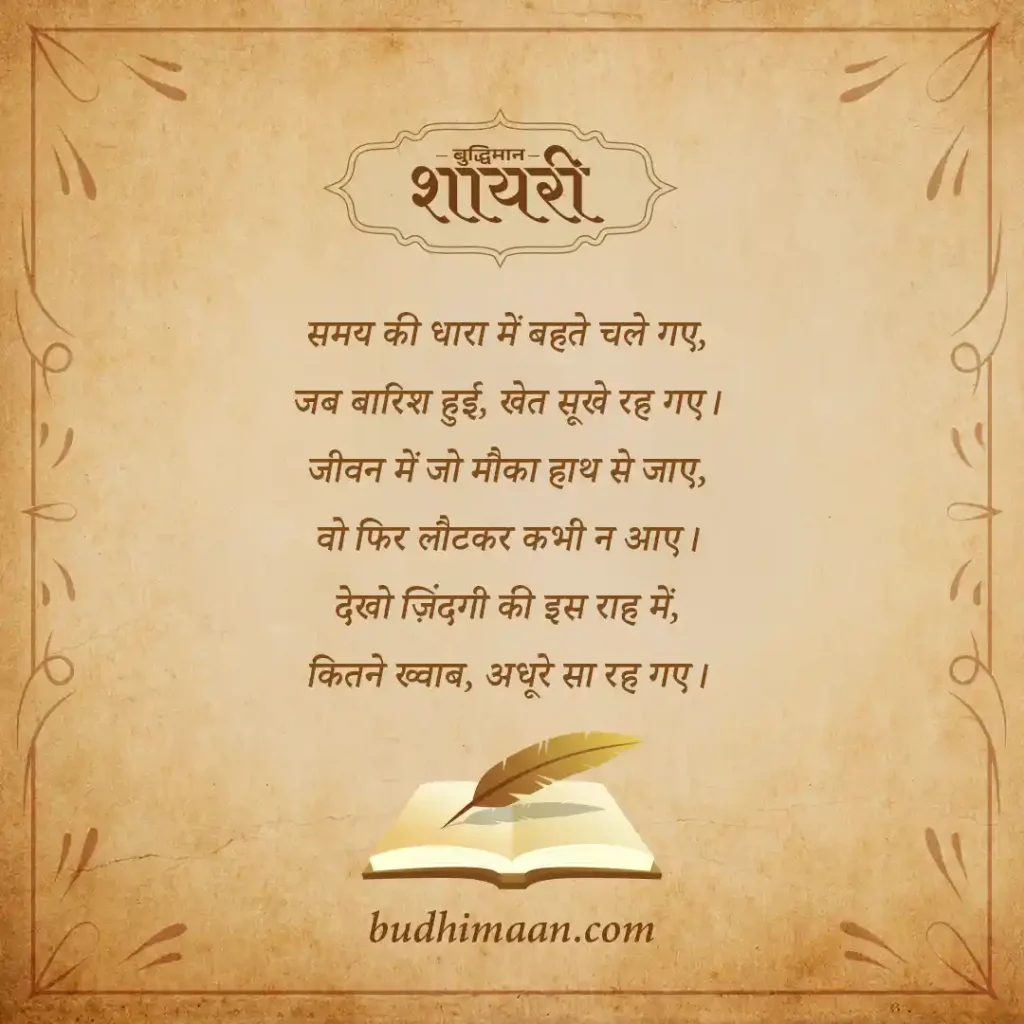
आशा है कि आपको इस मुहावरे की समझ आ गई होगी और आप इसका सही प्रयोग कर पाएंगे।
Hindi to English Translation of का वर्षा जब कृषि सुखानी – Ka Varsha Jab Krishi Sukhani Idiom:
Meaning: “का वर्षा जब कृषि सुखानी” (Rain when the crop has already withered) is an idiom used when the crucial time for something important has already passed, and now that thing no longer holds significance.
Usage: When a thing or assistance arrives much later than needed and is now of no use, this idiom is used.
Examples:
-> Ananye needed a guide to pass her exams. But when her friend gave her the guide, the exams were already over. Ananya said, “What’s the use of this guide now? This is like ‘rain when the crop has already withered’.”
Special Note: Just as when a crop needs water and it doesn’t rain when the crop requires it, and it rains only after the crop has already dried, that rain is of no use. Similarly, many times we need something, but by the time we get it, it is no longer significant for us.
Conclusion: From the idiom “का वर्षा जब कृषि सुखानी”, we learn that timely assistance and resources are essential. Assistance that comes late is often ineffective.
For more information and to learn about other idioms, stay tuned to Budhimaan.com.
Story of Ka Varsha Jab Krishi Sukhani Idiom in English:
Premchandra lived in a small village. He was a hardworking farmer who toiled in his fields. However, he always delayed watering his crops. He thought that he would water them whenever he found the time.
The village experienced intense sunlight and heat, and most of the fields dried up. Premchandra thought it was time to water his fields. But by the time he went to irrigate them, most of the crops had already withered.
That was when it suddenly started to rain in the village. Premchandra was disheartened. He now understood the meaning of “rain when the crop has already withered”. The rain came at a time when the crops had already dried up. He now realized the importance of hard work and timely action.
That evening, he met his neighbor Sudhir, who had watered his fields on time. Sudhir’s crops were lush and healthy. Premchandra said to Sudhir, “I’ve understood the importance of using time wisely.”
From this story, we learn that we should make proper use of our time and not delay, as sometimes delays render help and resources ineffective.
I hope this gives you a clear understanding of the proverb and how to use it correctly
FAQs:
क्या इस मुहावरे का कोई ऐतिहासिक संदर्भ है?
इस मुहावरे का सीधा कोई ऐतिहासिक संदर्भ नहीं है, लेकिन यह कृषि और मौसम से संबंधित सीधे भाषा में अभिव्यक्ति करता है।
इस मुहावरे का उपयोग किस प्रकार से होता है?
यह मुहावरा गहराई से विचार करने या किसी स्थिति को समझाने के लिए उपयोग होता है।
कृषि मुहावरा “का वर्षा जब कृषि सुखानी” का मतलब क्या है?
इस मुहावरे का अर्थ है कि जब वर्षा होती है, तब कृषि खेतों को सुखाने का समय आता है।
इस मुहावरे का विरुद्धार्थक क्या हो सकता है?
इसका विरुद्धार्थक हो सकता है “कृषि सुखानी जब वर्षा न हो” जिससे समझाया जा सकता है कि वर्षा की कमी में कृषि में समस्याएं हो सकती हैं।
क्या इस मुहावरे का कोई विज्ञानिक सिद्धांत है?
नहीं, इस मुहावरे का कोई विज्ञानिक सिद्धांत नहीं है, यह केवल एक अभिव्यक्ति है।
हिंदी मुहावरों की पूरी लिस्ट एक साथ देखने के लिए यहाँ क्लिक करें



